
Indicator scoreboard
Germany - January wholesale prices dropped 0.5 percent but rose 3.8 percent when compared with last year. The drop was due largely to lower oil prices and an unexpected decline in food prices. Wholesale consumer goods jumped 0.4 percent and manufactured products excluding refined oil rose 0.3 percent. Excluding oil products, wholesale prices rose 0.1 percent on the month and 3.0 percent on the year. Many analysts view WPI cautiously, given the high weighting of oil products in the index, and say the Producer Price Index, due out Friday, gives a better picture of the German inflation situation.
December real retail sales (excluding auto dealerships, petrol stations and wholesale warehouses) declined 2.9 percent when compared with last year. Even after adjusting for two fewer shopping days in December 2000 than a year earlier, real seasonally and calendar adjusted sales (excluding autos/petrol) were up only 0.3 percent when compared with last year. Including all retail sales categories, retail sales fell 0.8 percent.
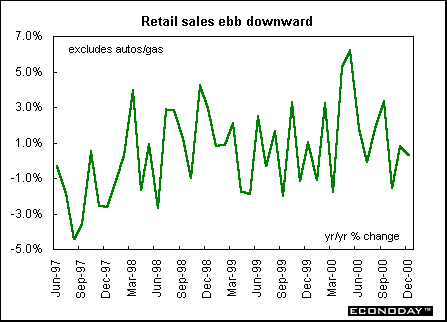
December non-adjusted trade surplus was DM2.1 billion as imports grew faster than exports. Exports rose 11.6 percent while unadjusted imports grew at a torrid 23.3 percent pace when compared with last year. Export growth has slowed substantially in recent months after being up 28 percent in October. Exports to non-EU countries, up 31 percent in October, are up 11.4 percent in December. The slowdown in the import growth rate is less pronounced when compared with last year, from 30 percent in October 2000 to 23.3 percent in December. While most of the strong growth rate is likely due to higher oil prices, there remains the question of how much cumulative effect the weak euro in the past year is having. The Statistics Office data must be interpreted cautiously, since they are adjusted for neither seasonal nor inflation effects. The Bundesbank will release seasonally adjusted and inflation adjusted data in about two weeks.
France - November seasonally adjusted current account surplus widened substantially to E2.123 billion from E732 million in October, due mainly to gains in investment revenue flows and the merchandise trade balance.
December seasonally adjusted merchandise trade balance inched into the black with a surplus of E31 million thanks to a decline in imports. Exports rose 0.1 percent led by semi-finished and consumer goods. Exports to other EU countries declined. Imports dipped 1.1 percent despite a rise in energy imports. For the full year 2000, the unadjusted trade surplus fell to E1.998 billion from E16.546 billion in 1999, as imports were boosted by higher oil prices and robust domestic demand, while slacker foreign demand undercut export growth.
Italy - December seasonally and workday adjusted industrial output rose 2.4 percent thanks to strong orders and a surge in consumption over Christmas. Average 2000 output rose 4.8 percent, the largest increase since the index began in 1995. When compared to last year, output rose 13.1 percent, the biggest rise since the index began.
Fourth quarter preliminary real gross domestic product rose 0.8 percent and 2.7 percent when compared with last year. However, the strong growth may have been understated by the fact the fourth quarter had three less working days than both third quarter 2000 and fourth quarter 1999. Similarly, 2000 as a whole had five less working days than 1999, acting as a significant drag on the year's growth. It was noted that the fourth quarter preliminary data was "particularly early," coming just 45 days after the end of the reference period and so would be even more subject to revisions than usual.
Britain - January seasonally adjusted input prices rose 0.5 percent and 6.3 percent when compared with last year. On a non-seasonally adjusted basis, input prices actually fell 0.1 percent on the month as a result of lower crude oil prices. Crude oil prices fell 2.8 percent on the month leaving them 10.1 percent higher than a year earlier. However, unadjusted output prices dropped 0.4 percent but rose 1.9 percent on the year. The drop was largely because of falling petroleum products prices. The decline was the highest since May 1986 and the annual rate was the lowest since October 1999. Core output prices, which exclude food, beverages, tobacco and petroleum, fell only 0.1 percent on the month, keeping the annual rate steady at up 0.6 percent.
January retail price index fell 0.6 percent and was up by 2.7 percent on a year earlier. RPIX, which excludes mortgage interest payments, fell 0.7 percent on the month in January but rose 1.8 percent when compared with last year. The RPIX is now at its lowest rate since comparable records began in January 1976. RPIX has been below its 2.5 percent government target for 22 consecutive months. RPIY, which excludes both mortgage interest payments and indirect taxes, fell 0.7 percent on the month and was up 1.5 percent on the year.
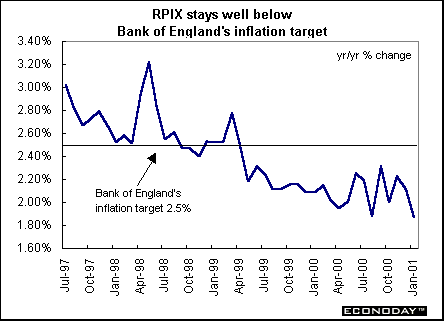
Because of differences in the way the harmonized index of consumer prices is calculated, British inflation as measured by the HICP averaged only 0.8 percent in 2000. This compares with a European Union average of 2.1 percent and of 2.3 percent in the European Monetary Union.
January claimant count unemployment rate is 3.5 percent, the lowest rate since September 1975. Claimant count unemployment dropped 25,500 in January. Unemployment on the International Labor Organization measure in the three months to December fell 21,000 on the previous period and was down 169,000 on the year. The ILO unemployment rate remained unchanged at 5.3 percent.
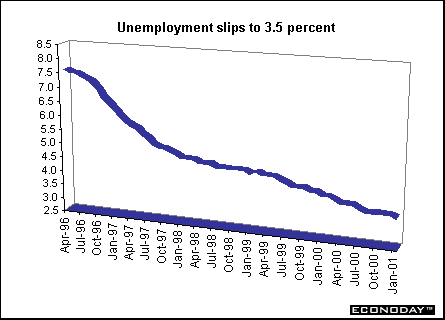
Average earnings in the three months to December rose 4.4 percent when compared with last year and were up from the 4.2 percent posted in the three months to November. Earnings for December alone rose 4.8 percent on the year, up from 4.4 percent in November and 4.1 percent in October. Bonuses in December lifted earnings by 0.3 percentage point, contrasting with the negative impact of 0.5 percentage points on the data for both November and October. The increase was attributed to bonus payments by private sector financial intermediaries that were larger than the same time last year.
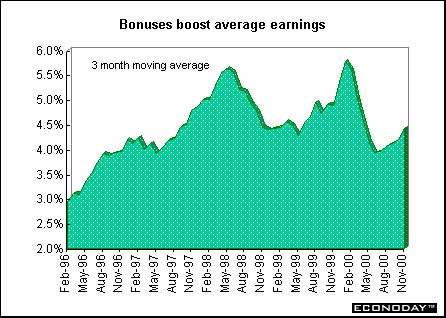
January seasonally adjusted retail sales volumes rose 0.7 percent and were up 3.3 percent on a year earlier. The latest data show a "marginal slowing down" from the levels seen in the second half of 2000. This was much lower because of the exceptionally strong sales growth seen in January 2000 following the millennium celebrations. The 0.7 percent sales increase was low for a January.
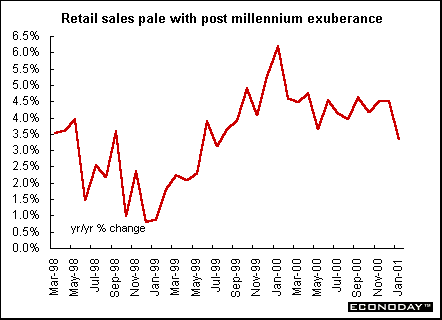
Asia
Japan - January bankruptcies fell 0.4 percent when compared with last year as fewer construction, manufacturing and retail companies went under. Liabilities left by bankrupt companies' rose 74 percent to 1.02 trillion yen ($8.82 billion). Bankruptcies rose 22 percent last year. This year might be even tougher as a slew of bank mergers and new accounting rules may put more pressure on lenders to pull the plug on companies.
December current account surplus narrowed, falling 20.7 percent from a year earlier. The current account surplus, the broadest measure of Japan's trade with the rest of the world, shrunk to 688.5 billion yen ($5.9 billion) before seasonal adjustment, down from 868.6 billion yen a year earlier. The current account measures trade in merchandise, services, tourism and investment. It is calculated by determining the difference between Japan's income from foreign sources against payments on foreign obligations. It excludes net capital investment. For the year 2000, the current account surplus widened 3.7 percent to 12.620 trillion yen from a year earlier, following a decline of 22.9 percent in 1999. But Japan's services deficit, which stood at 5.107 trillion yen for the year, shrunk by 1.044 trillion yen from 1999 due to the fact that the yen was stronger on average during the year, and as revenues from Japan's financial services and patents increased.
December merchandise trade surplus fell 27 percent from a year earlier as exports continued to decelerate in line with slower growth in the United States and Asia. Growth in imports, up 21.4 percent, outpaced growth in exports, up 8.2 percent. Exports totaled 4.439 trillion yen in December. Exports of automobiles were up 9.3 percent, while those of semiconductors and other electrical equipment rose 12.5 percent. Crude-oil imports rose 38 percent in terms of value, but fell 0.1 percent in terms of volume, while imports of semiconductor and other electrical equipment were up 45.1 percent.
Americas
Canada - January unadjusted consumer prices were down 0.3 percent mainly due to decreases in prices for automotive vehicles and travel tours. Compared with a year earlier, the CPI was up 3.0 percent. The CPI excluding food and energy climbed slipped 0.1 percent but was up 2.0 percent when compared with last year. The Bank of Canada has a control target of one to three percent for consumer price inflation. The Bank bases its policy actions on a core measure of the CPI excluding food, energy and the effects of indirect taxes. On a seasonally adjusted basis, the CPI rose 3.1 percent in January and 2 percent when compared with last year.
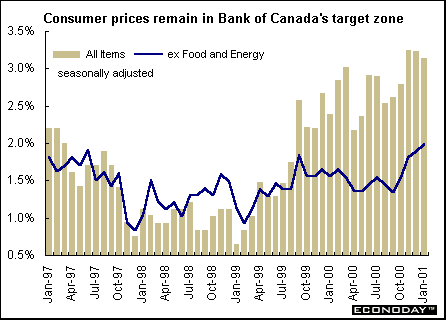


Introduction • Global Stock Market Indexes • Recap of Global Markets • Currencies • Indicator Scoreboard

The Bottom Line • Looking Ahead
|